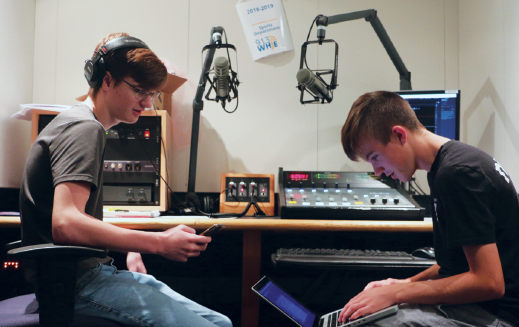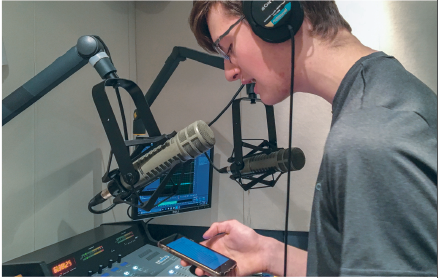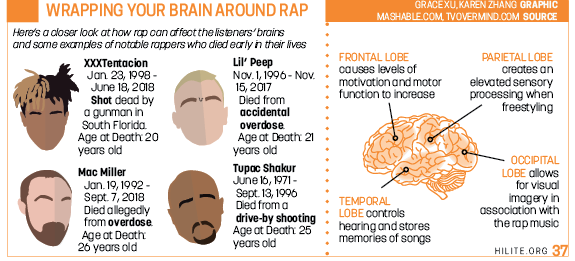
Every day, rapper and sophomore Isaac Brown tunes in to rap music. At the same time, Annie Kim, officer of the Share The Music Club and sophomore, can be found listening to or playing classical music, while Sam Chenoweth, associate director of choirs, turns on musical theater he enjoys. The three said music is a vital part of their lives.
They are hardly alone. According to Nielsen Music, in 2017, Americans listened to music for 32 hours per week. Students at CHS school create and listen to a wide variety of music, ranging from cutting-edge electronic to the oldest Baroque. With such a constant presence in students’ lives, music also can have an effect on listeners’ moods.
“Some songs end up being earworms, and those are usually the upbeat ones or a slower one with a nice melody,” Chenoweth said. He cited the main line of “Great Balls of Fire,” a song he taught the freshman men’s choir, Counterpoints, as an example.
“It can be something fun to remember throughout the day,” Chenoweth said. “Or it can even change their mood. If a student comes to choir not having the best day and we do a song that is fun and exciting and they enjoy, it can change the way they feel.”
This effect can go both ways. Kim mentioned the song “1-800-273-8255” by rapper Logic, which references the phone number of the American National Suicide Prevention Lifeline. According to Kim, that song may make some people depressed.
Just last month, rapper Mac Miller died allegedly from an overdose. Many are now wondering if rapping can have negative impact on rappers.

Rapper and sophomore Isaac Brown (left) prepares to record his new songs alongside DJ and sophomore Ethan Meneghini (right) in one of the school’s recording studios during late start. This was the first time the pair had worked together. Both Brown and Meneghini said they were excited to begin working.
However, Brown said listening to rap has a positive impact on his life.
“Listening to rap sometimes has kept me from doing things that I know I shouldn’t be doing, so I think it has helped me on a way more personal level,” Brown said.
However, lyrics of songs can also affect students. There are many popular songs that cover negative themes. Especially with rap, a common stereotype is that rap is about sex, drugs and money.
“Sometimes there’s not really a lot of school appropriate songs with young kids listening to them, so that kind of speeds up the maturing process,” Kim said.
Lyrics can have different impacts, depending on the person. Chenoweth said one experience he had with lyrics was in the recent fall musical “Edges.”
“The words in that show are about so many different things, but about things that are real life and that impact people and that don’t necessarily mean the same thing to everyone so it’s cool to be able to latch on to them in your own way,” Chenoweth said. “In general, I like anything with a story. Even more than the music, it’s the lyrics I get hooked on more.”
Brown said rap lyrics can often have negative connotations associated with them, but that’s not the case for him.

Rapper and sophomore Isaac Brown reads off his phone screen that has lyrics on it. Brown said he wants to convey his honesty through his music.
“People think that rappers are very aggressive or violent or all they care about is money, sex and drugs,” Brown said. “People think of the artist as bad, and I don’t think that’s great, especially for me, because if you’re looking at a certain artist and hear those lyrics you associate them with that bad stuff. So I don’t write about that, I write about my personal feelings.”
He said his music even pokes fun at the negative aspects of his genre.
“I kind of joke about it and put all of that stuff aside. Like these rappers talk about this, but I talk about how I live my life and going through different stages of my life and how difficult it may be or how great it may be,” Brown said.
Brown brought up the messages of his own music, and how he said he intends to make an impact on listeners.
Brown said, “I want people to know that I am 100 percent honest with not only myself but with other people,” he said. “I want everyone to know that I put everything in my life into this; I don’t want anyone to think that I put half-effort.
“Putting your own emotions behind music is exactly what makes it good music. If you don’t, then it’s not worth anything.”
In the end, Brown said rap has impacted his life positively. He is currently working on pieces with DJ and sophomore Ethan Meneghini and puts passion into his work, with themes mainly from his personal life.
Brown said, “It’s about more than (just) gangs and Compton. It’s an outlet.”
“There’s a quote I really like, ‘When words fail, music speaks,’” Chenoweth said. “Music can touch people in ways that other forms of communication can’t. It’s the most authentic form of communication.”
































![What happened to theater etiquette? [opinion]](https://hilite.org/wp-content/uploads/2025/04/Entertainment-Perspective-Cover-1200x471.jpg)













































![Review: “The Immortal Soul Salvage Yard:” A criminally underrated poetry collection [MUSE]](https://hilite.org/wp-content/uploads/2025/03/71cju6TvqmL._AC_UF10001000_QL80_.jpg)
![Review: "Dog Man" is Unapologetically Chaotic [MUSE]](https://hilite.org/wp-content/uploads/2025/03/dogman-1200x700.jpg)
![Review: "Ne Zha 2": The WeChat family reunion I didn’t know I needed [MUSE]](https://hilite.org/wp-content/uploads/2025/03/unnamed-4.png)
![Review in Print: Maripaz Villar brings a delightfully unique style to the world of WEBTOON [MUSE]](https://hilite.org/wp-content/uploads/2023/12/maripazcover-1200x960.jpg)
![Review: “The Sword of Kaigen” is a masterpiece [MUSE]](https://hilite.org/wp-content/uploads/2023/11/Screenshot-2023-11-26-201051.png)
![Review: Gateron Oil Kings, great linear switches, okay price [MUSE]](https://hilite.org/wp-content/uploads/2023/11/Screenshot-2023-11-26-200553.png)
![Review: “A Haunting in Venice” is a significant improvement from other Agatha Christie adaptations [MUSE]](https://hilite.org/wp-content/uploads/2023/11/e7ee2938a6d422669771bce6d8088521.jpg)
![Review: A Thanksgiving story from elementary school, still just as interesting [MUSE]](https://hilite.org/wp-content/uploads/2023/11/Screenshot-2023-11-26-195514-987x1200.png)
![Review: "When I Fly Towards You", cute, uplifting youth drama [MUSE]](https://hilite.org/wp-content/uploads/2023/09/When-I-Fly-Towards-You-Chinese-drama.png)
![Postcards from Muse: Hawaii Travel Diary [MUSE]](https://hilite.org/wp-content/uploads/2023/09/My-project-1-1200x1200.jpg)
![Review: "Ladybug & Cat Noir: The Movie," departure from original show [MUSE]](https://hilite.org/wp-content/uploads/2023/09/Ladybug__Cat_Noir_-_The_Movie_poster.jpg)
![Review in Print: "Hidden Love" is the cute, uplifting drama everyone needs [MUSE]](https://hilite.org/wp-content/uploads/2023/09/hiddenlovecover-e1693597208225-1030x1200.png)
![Review in Print: "Heartstopper" is the heartwarming queer romance we all need [MUSE]](https://hilite.org/wp-content/uploads/2023/08/museheartstoppercover-1200x654.png)



